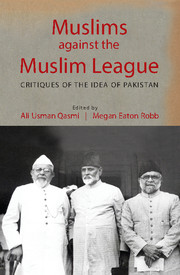Book contents
- Frontmatter
- Contents
- Acknowledgements
- Introduction
- 1 Maulana Husain Ahmad Madani and the Jami'at ‘Ulama-i- Hind: Against Pakistan, against the Muslim League
- 2 The Partition Conundrum: Perspectives, Experiences and Ambiguities from qasbahs in India
- 3 Choudhary Rahmat Ali and his Political Imagination: Pak Plan and the Continent of Dinia
- 4 Differentiating between Pakistan and Napak-istan: Maulana Abul Ala Maududi's Critique of the Muslim League and Muhammad Ali Jinnah
- 5 Advising the Army of Allah: Ashraf Ali Thanawi's Critique of the Muslim League
- 6 The Illusory Promise of Freedom: Mian Iftikhar-ud-Din and the Movement for Pakistan
- 7 Visionary of Another Politics: Inayatullah Khan ‘al-Mashriqi’ and Pakistan
- 8 Nonviolence, Pukhtunwali and Decolonization: Abdul Ghaffar Khan and the Khuda'i Khidmatgar Politics of Friendship
- 9 Islam, Communism and the Search for a Fiction
- 10 Muslim Nationalist or Nationalist Muslim? Allah Bakhsh Soomro and Muslim Politics in 1930s and 1940s Sindh
- 11 Dancing with the Enemy: Sikander Hayat Khan, Jinnah and the Vexed Question of ‘Pakistan’ in a Punjabi Unionist Context
- 12 Religion between Region and Nation: Rezaul Karim, Bengal, and Muslim Politics at the End of Empire
- 13 ‘The Pakistan that is going to be Sunnistan’: Indian Shi'a Responses to the Pakistan Movement
- 14 The Baluch Qaum of Kalat State: Challenging the Ideological and Territorial Boundaries of Pakistan
- Contributors
- Index
2 - The Partition Conundrum: Perspectives, Experiences and Ambiguities from qasbahs in India
Published online by Cambridge University Press: 28 February 2018
- Frontmatter
- Contents
- Acknowledgements
- Introduction
- 1 Maulana Husain Ahmad Madani and the Jami'at ‘Ulama-i- Hind: Against Pakistan, against the Muslim League
- 2 The Partition Conundrum: Perspectives, Experiences and Ambiguities from qasbahs in India
- 3 Choudhary Rahmat Ali and his Political Imagination: Pak Plan and the Continent of Dinia
- 4 Differentiating between Pakistan and Napak-istan: Maulana Abul Ala Maududi's Critique of the Muslim League and Muhammad Ali Jinnah
- 5 Advising the Army of Allah: Ashraf Ali Thanawi's Critique of the Muslim League
- 6 The Illusory Promise of Freedom: Mian Iftikhar-ud-Din and the Movement for Pakistan
- 7 Visionary of Another Politics: Inayatullah Khan ‘al-Mashriqi’ and Pakistan
- 8 Nonviolence, Pukhtunwali and Decolonization: Abdul Ghaffar Khan and the Khuda'i Khidmatgar Politics of Friendship
- 9 Islam, Communism and the Search for a Fiction
- 10 Muslim Nationalist or Nationalist Muslim? Allah Bakhsh Soomro and Muslim Politics in 1930s and 1940s Sindh
- 11 Dancing with the Enemy: Sikander Hayat Khan, Jinnah and the Vexed Question of ‘Pakistan’ in a Punjabi Unionist Context
- 12 Religion between Region and Nation: Rezaul Karim, Bengal, and Muslim Politics at the End of Empire
- 13 ‘The Pakistan that is going to be Sunnistan’: Indian Shi'a Responses to the Pakistan Movement
- 14 The Baluch Qaum of Kalat State: Challenging the Ideological and Territorial Boundaries of Pakistan
- Contributors
- Index
Summary
Writing about the impact of the partition of India, renowned Urdu writer Ismat Chughtai (1915–1991), born in qasbah Badaun, elaborates: ‘It wasn't only that the country was split in two – bodies and minds were also divided. Moral beliefs were tossed aside and humanity was in shreds … Families were torn apart. One brother was allotted to Hindustan, the other to Pakistan, the mother was in Hindustan, her offsprings were in Pakistan; the husband was in Hindustan, his wife was in Pakistan. The bonds of relationship were in tatters, and in the end many souls remained behind in Hindustan while their bodies started off for Pakistan.’
At least with regard to the qasbahs of the United Provinces (the state of Uttar Pradesh in independent India), this was a rather common story. Qasbahs or unique small towns that littered the state witnessed significant movement of people to Pakistan in the wake of the partition of the Indian subcontinent in 1947. Families were divided, several individuals departed to the newly created nation-state of Pakistan in search of greener pastures or to explore and experience the new homeland created ‘as a political idea.’ For whatever reasons, several people chose to remain at home in qasbahs. This suggests how opinions were divided in these areas with regard to the Muslim League-led demand for Pakistan. Qasbahs, like most towns and cities in North India, had individuals who were pro-Congress and anti-Congress, pro-Muslim League and anti-Muslim League. But the picture that emerged overall was one of great ambivalence and predicament. The pattern that emerges from qasbahs presents both critique and dilemma in regards to the very idea of Pakistan. It emerged as a shared pattern among the ashraf (well-born, Muslim gentry) families of UP in general and in qasbahs in particular from where members of families crossed borders to settle in Pakistan. Many, of course, chose to remain in the newly independent India. It was not unusual to see one brother leave while the other stayed behind. So what sets qasbahs apart from other towns and cities? For one, the emigration from qasbahs was not just limited to people moving to Pakistan. Both during and after the partition, several qasbati (of qasbah) individuals moved to larger towns and cities such as Delhi, Lucknow, Bombay, Allahabad and Aligarh, leaving behind divided families and communities.
- Type
- Chapter
- Information
- Muslims against the Muslim LeagueCritiques of the Idea of Pakistan, pp. 65 - 81Publisher: Cambridge University PressPrint publication year: 2017

